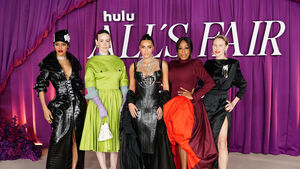A glimpse into the soulless world of influencers

Teyana Taylor, Sarah Paulson, Kim Kardashian, Niecy Nash-Betts and Naomi Watts at the London premiere of the Disney+ series 'All's Fair' at the Odeon Luxe in Leicester Square, central London. Picture: Martin Evans
Who Shot Kim Kardashian?
My wife recently asked me - very sweetly, very innocently - if I’d join her in watching the new Kim Kardashian legal drama, , created by Ryan Murphy. Now, I’m a supportive husband. I’m open-minded. I even pretend to have some basic understanding for how the Kardashians have become the role models for a generation of young women and even some gay men. But even with all that, I thoughtfully but firmly refused my life partner.
There were exaggerated sighs. There was melodrama. Tantrums were thrown. Loud voices were used. Some tears were shed and expletives uttered. But eventually, realising resistance was futile and with the grace and maturity of a sugar-infused two-year-old, I stopped screaming.
One episode, I said. Just one.
There is no going back. I cannot unsee what I have seen. There are no words strong enough in any language known to humankind to convey the catastrophic awfulness of what I witnessed. It is, without exaggeration, the worst thing I have ever seen that dared to call itself a television series. My skin crawled. My soul wilted. I experienced new emotions I previously associated only with food poisoning and killing cockroaches.
Kim Kardashian is a billionaire. She is clearly exceptional at whatever she did to become one. But she cannot act. At all. And this series -apparently based on the work of one of her divorce lawyers - only amplifies this fact, with every line delivery evoking aliens who simulate human conversation learned solely from and Donald Trump’s social media posts.
The show is rotten at its core. It glorifies a hyper-materialistic, hyper-sexualised, hyper-performative 'feminism' that bears no resemblance to any feminism that ever empowered real women. In this universe, all women are good - even when they’re terrible -because they’re women. All men are bad, even when they’re good, because they’re men. Every frame is a shrine to wealth. Every camera angle is engineered with the precision of a soft-porn perfume advert to glorify the protagonist, who is usually Kim.
The actors’ union SAG-AFTRA is currently in a panic about artificial intelligence writing scripts and replacing actors. The industry worries that AI will make television feel robotic and soulless. But after watching this Kardashian-produced monstrosity, if this is the standard of human-made television in 2025, then let the machines take over. If anything, they might accidentally improve matters. It genuinely cannot be worse.
What unsettles most is that the programme features actors, such as the iconic Glenn Close, who are accomplished, trained, paid enormous sums, yet behaving with less humanity than the original Tin Man in . At least AI tries to approximate human emotion.
Back in the living room, I told my wife after episode one that I would not - under any circumstances - be watching episode two. Not even if the house were on fire and the only route to safety ran through the television as episode two played.
But my wife, using every favour I have ever owed her and ever will owe her, persuaded me to watch “a little bit more”.
Thankfully, my worries that my wife had succumbed to the dark side eased somewhat when she explained her fascination:
“These are the people who come into our shop. These are the customers I see daily and who demand to get the products or attention they deserve."
Enhanced into glossy versions of Homo Sapiens these (usually, but not always) women come with an attitude: money equals value. Looks equal worth. If you have neither, you are invisible. Hence the need to pretend with performative social media displays, where every frame is a nod to wealth - clothes, cars, houses, products. is every vacuous influencer video melted into one heightened string of awfulness which makes the debauchery of ancient Roman orgies feel deep and meaningful.
It’s not relationships that matter; it’s things. Your husband cheats? Go shopping. Your life falls apart? Buy something. Want to feel empowered? Purchase empowerment, conveniently divided into four interest-free instalments. Someone (usually a man) hurts your feelings, he must be destroyed. You do something bad to someone (usually a man), it’s not your fault - you stood up for yourself and the sisterhood of ostentatiousness. And ironically, for a show about the most amazing female lawyers who ever lawyered, adhering to the constraints of the same law is optional.
In a superbly-awful genius marketing move, viewers can buy Kim’s ‘Skims’ line of fashion clothing, while watching her “perform”, straight from their phones via the next layer of this modern madness: financing apps of Klarna, Afterpay, PayPal Pay-in-4. These are “easy payments” drug fixes of influencer-bait consumerism: social-media sugar rush with monthly billing.
TikTok and Instagram pump the “next must-have” item straight into the bloodstream - those $29.99 limited-edition bear-shaped Starbucks plastic cups that resell for hundreds, even a thousand dollars; Apple’s $229.99 'iPhone Pocket', essentially a bikini for your phone now available on Apple store. Young men are not immune and have their own vices - crypto speculation, meme stocks, sports cards. These are gendered addictions, both feeding the same machine, both led by a stratum of parasitic influencers sucking the humanity profit from their consumer prey, having monetised loneliness, boredom and cultural drift.
Which brings me to the most disturbing element of Kim’s new show: not the writing, not the acting, not the politics, but how unintentionally honest it is. A window into a worldview where wealth is virtue, power is identity, and morality is an optional extra so long as it looks flawlessly beautiful.
There is no community. No loyalty. No higher ideal. Just influence and performance among the super-rich of society. But were we here before?
In the 1980s, was the TV show everyone talked about. Oil tycoons clawing at each other for money and power - JR scheming, Sue-Ellen getting revenge in her shoulder pads, Bobby magically reappearing from the dead and the entire nation debating over breakfast who shot JR. But here’s the thing about , as over-the-top as it was: the story acknowledged right and wrong. Characters deviated from a moral core, yes, but they knew it existed. They justified their actions. They wrestled with conscience. They were recognisably human. The 'Who Done It?' episode, which unmasked who tried to kill JR Ewing, is still one of the most-watched television episodes in US history. The phrase 'Who Shot JR?' entered popular culture on tee-shirts, car stickers and signs.
This new Kardashian-enhanced travesty has none of that. There’s no moral centre, no world beyond the next handbag or courtroom flirtation. The characters operate in a total ethical vacuum. Nothing matters except what they can get away with, and bonus points if it humiliates a man. None of them are empathetic. None are rounded. None feel remotely like people you’d want to meet. It’s a universe built on selfies and silicone, not soul.
Now imagine trying to build a cultural moment around this new Kardashian drama. “Who Shot Kim Kardashian?” No one cares. No one will care. The only real question it inspires is: “Where can I buy her Skims?”.
And between a world where we debated who shot JR and a world where we’re encouraged to empty our pockets to faintly imitate a vacuous billionaire influencer, I know exactly which one I’d rather live in.
Unfortunately, in my world an episode three exists…





